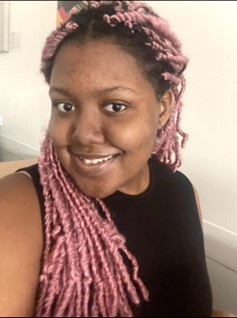Part of the ‘My Story’ series of reflections by Student Success Diversity Mark Officers.
‘We humans are far too complex to be neatly categorised and yet, we continue to insist on reducing ourselves and others into neat packages. It is in the language we use, in what is labelled as “normal” and what is labelled as “other”, and shows itself in many other subtle and not-so subtle ways. It shows very clearly in the way academia is constructed to centre Western ideals of knowledge, and discount anything different. This is something I have noticed in my studies as an undergraduate in Sociology, so when I heard of the opportunity to be a DMO, I (not literally) jumped at the chance.
So far, everything has made a lot of sense and I feel very comfortable to give my entire self to the role. The value of my ideas and experiences is never underestimated and I have never once felt excluded from the conversation. It is this feeling of belonging that I want to bring to my studies as well. A truly inclusive environment means that learning will be an exciting back-and-forth conversation and not a one-way street.
One of the greatest challenges I anticipate is dealing with how I will be perceived. When having difficult (but necessary) conversations, there will be pre-conceived notions that could bar the work I hope to do. As a female student of colour (an identity so far removed from the constructed ideal of a scholar, or anyone who knows what they are talking about for that matter), people have already come to their own conclusions about me before I have even said a word. At this point, I have grown used to the backhandedness of “You speak so well!” said with absolute astonishment. And, a classic, “Your English is so good”, as though decades of British colonisation and its persevering legacy somehow never happened. In any case, there is much to be done, and it just reminds me of the importance of this work and why I do it in the first place.
A commitment to diversity means doing the work of unlearning, deconstructing and decentring deep-seated ideals. It is rather uncomfortable work to shift what we have known to be true for so long. It involves recognizing many convenient realities and making a conscious effort to disrupt them. It would be much easier to ignore the idea of inclusion and the importance of belonging in the classroom and I bear this in mind as I prepare to start discussing with convenors. It is very likely that I will encounter dismissive, indifferent, and potentially even rude people on this journey, but I remain motivated by the importance of creating a space where everyone feels welcome and safe to be their true, entire and authentic selves. Whatever I encounter will be well worth the progress I hope to make and see as time goes on.’

